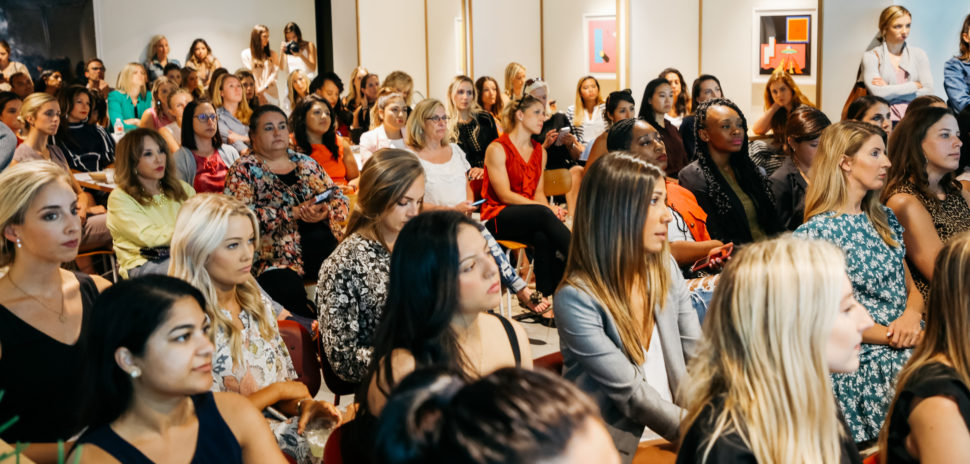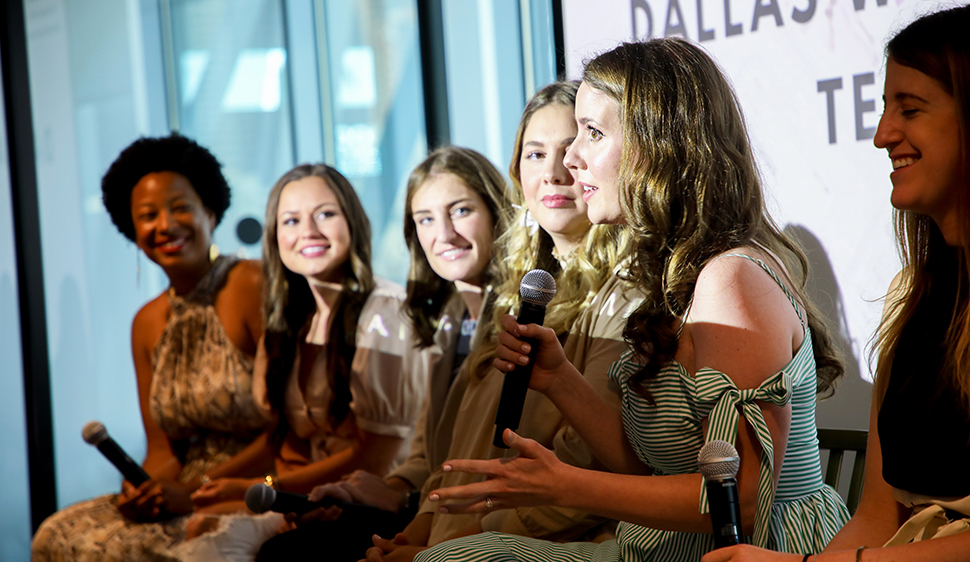Female-focused coworking concepts. The Forbes list of America’s richest self-made women. An entire summit dedicated to local women of innovation. A $25 million commitment to inspire the next generation of women in STEM. We’ve been heavily covering Dallas’ female founders this year, along with those continuing to be trailblazers in their industries.
It’s obvious North Texas is overflowing with powerful female entrepreneurs—case in point by way of the huge crowd gathered at the Women in Tech Tell All event last night. Held at WeWork Victory Plaza, the panel discussion was fittingly accompanied by glamorous cocktails and munchies from Hero and a signature braid bar by Birdie.

[Photo: KlearCut Media]
Sitting on the panel was five women who all founded tech startups in Dallas—Rachel Sipperley of Rent My Wardrobe, Elizabeth Reza and Gabrielle Muzel of Book a Birdie, and Alex Halbardier of Ride Alto—along with San Francisco-based Productable’s Rachel Kuhr. It was moderated by local ‘FashionPreneur’ Leah Frazier.
Each female founder gave guests the inside scoop on their personal experience launching technology-driven platforms, and what they learned along the way. Here’s what they had to say.
1. Perfection is the enemy of profit
Kuhr is a sort of ‘innovation expert,’ as she most recently led Product and Innovation support for Mark Cuban’s portfolio of companies. Now, she is the founder of Productable, a “company growth catalyst” that supports product and service businesses through systematic innovation.
She said that since Productable is a difficult concept to explain, her personal experience has been more about practicing her sales pitch to actually have some “meat behind it.” You have to put yourself in front of people who are willing to listen.
She iterated that you can’t spend too much time fretting over the small details of launching your startup, because everything is going to constantly change. Don’t try to build everything at once up-front. “Perfection is the enemy of profit,” she said. “The best way to innovate is increase your speed of innovation.”
2. It’s not necessarily all about the money, money, money
Reza and Muzel (who happen to be co-founders and sisters) haven’t yet raised any money for Book a Birdie—they’re entirely self-funded. Reza explained that in their eyes, having an investor on board was like metaphorically “going to bed.” She even pointed to the popular saying: “Ask for money, get advice. Ask for advice, get money twice.”
The women wanted the perfect person to go into business with, because they considered an investor another partner. And when they do decide to pursue funding—which they say will be soon—Muzel said they’re going to “be very clear about their vision.”
They chose to launch their app in Beta mode, and spent the past year crowdsourcing and gathering consumer feedback. It’s a learning process.
READ NEXT Birdie Beauty App Launching Hairstyling ‘On the Fly’
“Fail quickly. Failure is the name of the game,” Muzel said. “Everyday I have a failure is a day I’m closer to getting it right.”
The sisters agreed they learned so much more with Birdie actually being on the market, rather than holding on the launch or trying to raise a round.
“Never discount the customer and what you can get from them,” Reza said. “You need to make a decision that you’re just going to launch the thing. … If it can work, get it out there.”
3. Sometimes, you have to risk it all
Sipperley’s Rent My Wardrobe celebrated its launch in April with an A-list party at Circo, which even featured a taping of the Real Housewives. Cast-member Kameron Westcott and her husband are among the investors in the fashion app, which was near securing $1 million in seed funding with a $4 million cap at the time of the launch.
READ NEXT DSW19: Real Housewives of Dallas Highlight Rent My Wardrobe Launch Party
But it wasn’t always that glamorous.
At the panel, Sipperley said before getting the funding, she bootstrapped. She spent her entire life savings on launching Rent My Wardrobe—describing it as essentially “jumping off a cliff and hoping to find a plane.” But, despite all the sacrifices, she said she had to bet on herself.
She emphasized that it’s important not to focus on what’s wrong. “The technology is never going to get there,” she said. Instead, you have to figure out what works and what doesn’t, before wasting a ton of money on the small things.
“And I still don’t take a salary for myself. I figured out how to make it work,” she said. “Would you bet your life savings?”
4. Don’t build an engine when you just need a skateboard
When asked how much time it typically takes to launch, Halbardier pointed to the concept of MVP.
A Minimum Viable Product is one with a smaller number of features—enough to satisfy customers early-on—that can provide feedback for product development in the future. Halbardier said it’s a powerful concept, but important, because you “don’t want to build an engine when you just need a skateboard.” Don’t go overboard in the beginning.
She emphasized how important consumer research is, but warned not to spend too much time in research mode. She said a founder needs to learn with the product, and constantly reframe how he or she thinks about research.
READ NEXT Dallas-based Ridesharing Startup Alto Raises $13M, Plans to Launch Next Month
“Try to keep things in sync,” she said. “Raise your confidence as you raise your investment.”
Halbardier also discussed how Alto is seed-backed (Alto entered the market with $13M from two rounds of funding), and how that was necessary prior to launch. The Alto model necessitated a big raise and VC funding was essential.
“Ask what the economics of your plan are, then you’ll have a number,” she said. “Find out what is required to launch, then go find the right funding vehicles.”
![]()
Get on the list.
Dallas Innovates, every day.
Sign up to keep your eye on what’s new and next in Dallas-Fort Worth, every day.




























